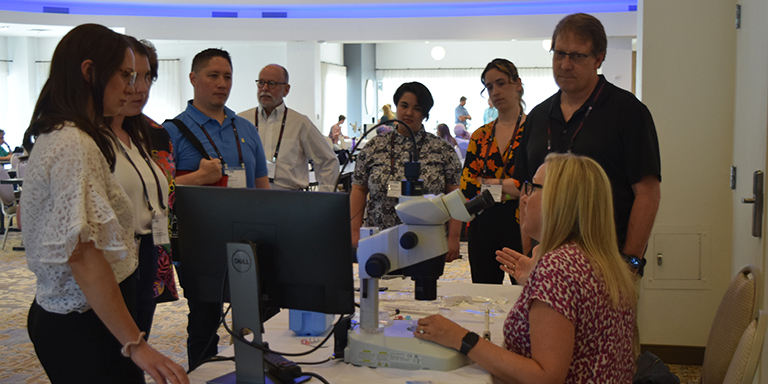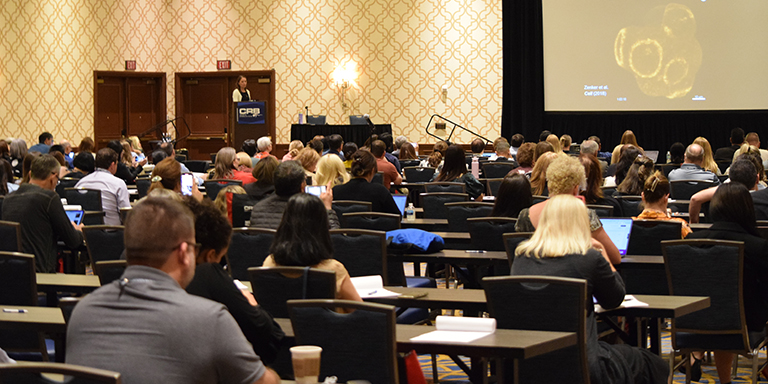
Newsletter
The College of Reproductive Biology (CRB) is a not-for-profit special interest group of the American Association of Bioanalysts (AAB).
Navigating Legislative Changes Affecting ART
CRB Legislative Committee
The Legislative Committee of the College of Reproductive Biology (CRB) is dedicated to representing the interests of our members in the face of evolving legislative and regulatory landscapes. Our mission is to support the advancement of reproductive science, support patient care, advocate for laboratory personnel and engage with lawmakers, regulatory bodies, and relevant organizations to promote informed and balanced legislation. Through research, policy analysis, and open communication, we aim to be a trusted resource for policymakers and a strong voice for our field.
The recent legislative crisis in Alabama serves as a stark reminder of the complex and far-reaching implications of personhood laws. While initially intended to address issues surrounding abortion, these initiatives have had unintended consequences that extend directly into the realm of fertility treatment. Clinics and healthcare providers faced restrictions that impacted their ability to offer standard fertility treatments, including the freezing and disposal of embryos. This disrupted patient care and created legal ambiguities that jeopardized both providers and patients. What unfolded in Alabama is a cautionary tale, illustrating how legislative changes in one state can set a precedent that influences policy nationwide.
The threat to patient care and safety of our laboratory colleagues is not limited to conservative states. As discussions around reproductive rights continue to gain momentum, it is crucial that we remain vigilant and proactive in advocating for legislation that supports the safe and ethical practice of reproductive medicine. Many view abortion law as solely affecting maternity care, but it has significant implications for fertility treatments as well. Legal definitions of when life begins can influence embryo handling, storage, and even the development of new reproductive technologies. Fertility clinics may face increased scrutiny and legal challenges if embryos are granted personhood status. We encourage legal experts to engage in these conversations and help clarify the nuanced ways in which reproductive healthcare and fertility treatments intersect. Their insights are invaluable in shaping thoughtful, legally sound policies.
While discussions around reproductive rights often involve deeply personal beliefs. As scientists and healthcare providers, we must approach these conversations with empathy and respect. When considering questions such as "When does life begin?" or "How do personal choice and sanctity of life arguments coexist?" It is important to foster dialogue that encourages understanding rather than division. We recommend involving legal and communication experts to develop strategies for navigating these discussions effectively, both within our professional community and with the public.
Recent executive actions by President Donald Trump have introduced policies that could significantly impact in vitro fertilization (IVF) labs and embryologists. In January 2025, President Trump issued an executive order that, while primarily addressing gender definitions, incorporated language supporting fetal personhood. This concept, which grants legal rights to embryos from the moment of conception, could lead to stricter regulations on IVF practices, potentially affecting the handling and disposition of embryos in fertility clinics.The implications of fetal personhood are extensive. Recognizing embryos as legal persons could criminalize certain aspects of IVF, such as the selective reduction of embryos or the discarding of non-viable ones, practices currently standard in many fertility treatments. This shift might expose IVF practitioners and embryologists to legal challenges or require significant alterations to existing protocols to ensure compliance with new regulations. It's important to note that while President Trump has publicly expressed support for IVF and proposed making the procedure more accessible, these recent policy changes introduce complexities that could counteract such support. The evolving legal landscape necessitates that IVF professionals stay informed and possibly adapt their practices to align with new federal guidelines.
The CRB Legislative Committee is dedicated to proactive advocacy, advancing reproductive healthcare through strategic initiatives. The current agenda focuses on engaging broader audiences through online symposiums to raise awareness and foster knowledge-sharing. It also involves drafting letters in support of legislative efforts that protect and promote reproductive healthcare, positioning CRB as a trusted resource for policymakers. Additionally, the committee prioritizes gathering input from CRB members on key legislative issues to ensure their voices are heard and represented effectively.
Furthermore, It is essential to address misconceptions about the regulation of the IVF field. Contrary to the perception that it is unregulated, fertility clinics are subject to rigorous oversight:
- FDA Regulations: The FDA mandates testing and screening for donor tissues to prevent infectious disease transmission.
- CLIA Compliance: Clinics performing diagnostic testing must be registered under the Clinical Laboratory Improvement Amendments (CLIA) of 1988, ensuring quality control and personnel qualifications.
- Data Reporting: IVF clinics must submit detailed outcome data to the CDC’s National Assisted Reproductive Technologies (ART) Surveillance System (NASS).
- Accreditation: Membership in the Society for Assisted Reproductive Technology (SART) and accreditation by CAP or The Joint Commission (TJC) further ensure adherence to best practices.
- Educational and Certification Requirements: Directors of ART laboratories are required to hold board certification from the American Board of Bioanalysis (ABB).
These regulations collectively ensure high standards of care and patient safety.
The CRB legislative committee is developing a brochure to provide clear, concise information on these regulations. This resource will help dispel misconceptions and educate colleagues and stakeholders about the extensive oversight governing fertility clinics. As we continue our advocacy efforts, we urge CRB members to share their perspectives on legislative issues and participate in shaping our approach. Together, we can protect and advance the field of reproductive biology and ensure that patients receive the highest standard of care.
The CRB Legislative Committee:
Nanis Nassar, Msc., TS(ABB)
Wes Edmonds, Ph.D., HCLD/ELD/TS(ABB)
Robin Baird, J.D.
Murat Basar, Ph.D.
Alexis Adler
CRB News Articles
03/22/2025
Vol. 14, No. 1
03/25/2025
Upcoming CRB Webinar
03/25/2025
Register Now for the 27th Annual CRB Symposium
03/25/2025
CRB Symposium Pre-Conference Workshop
03/25/2025
Navigating Legislative Changes Affecting ART
03/25/2025
The Importance of the 'Hows' and 'Whys' in Assisted Reproduction
03/25/2025
Understanding the Warming Procedure for Vitrified Embryos
03/25/2025
Andrology Antics by Samuel Prien, Ph.D., HCLD(ABB)
03/25/2025
A Special Thanks to the CRB Publication Committee Members
CRB Standing Rules - Log in to view



